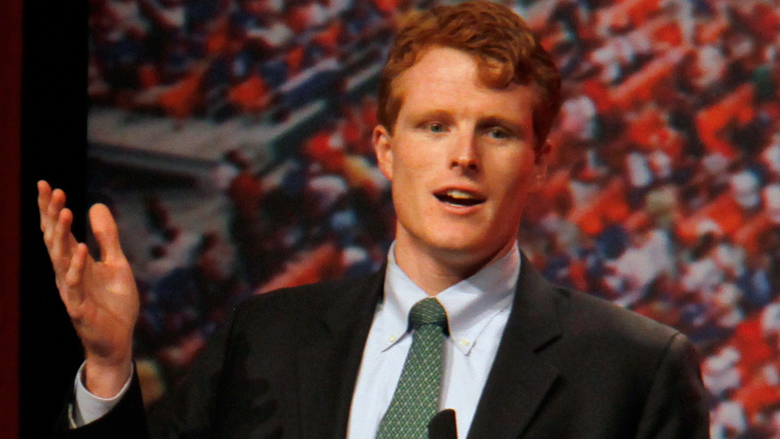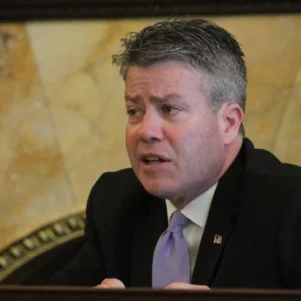Political myth-making: Another ‘Kennedy for governor’ sighting
By Joseph Tortelli | October 6, 2016, 7:06 EDT
 (Courtesy of Wikimedia)
(Courtesy of Wikimedia) The headlines said it all: Kennedy and Baker tied in poll.
With the 2016 elections still ahead, speculation about the 2018 governor’s race has already begun to percolate. And who can resist the tantalizing prospect of a Kennedy – any Kennedy – challenging any incumbent Republican?
This Kennedy in question is Congressman Joe Kennedy III, who succeeded the retiring Congressman Barney Frank in 2012. Holding a safe Democrat House seat, Kennedy is in the midst of his second term representing the Bay State’s Fourth Congressional District. With the certainty of shoo-in reelection bids in 2016 and 2018, what are the chances of Kennedy taking on Governor Charlie Baker? Only slightly less than Elvis materializing to give it a go. But what the heck, it’s an eyeball catching story that builds up another Kennedy in the process.
Yes, the UMass Amherst/WBZ survey numbers puts Baker and Kennedy at 33 percent each, with nearly as many uncommitted voters. But that poll represents no more than another gubernatorial Kennedy mirage, quite as misleading as another Elvis sighting and surely no more substantial.
First, with an already bulging $4 million campaign war chest and an enviable favorability rating, Baker stands as a formidable foe. With his across-the-board popularity among Republicans, Democrats, and Independents, along with a reputation for managerial competence, Baker would clean the clock of the youthful-looking, 35-year old Kennedy in a head-to-head match-up. In the process of losing, Kennedy would be doing Baker the immeasurable favor of expanding his reputation far beyond the borders of this Commonwealth or New England. Beating a Kennedy would be the one thing that could burnish Baker’s progressive image with conservative Republicans outside the Northeast.
Second, the Kennedys never put a safe seat at risk. They play the long game, focusing on certain reelection until a seat beckons in the senate for easy pickings.
Third, the Kennedys always prefer the House or the Senate to a governorship. House and senate seats have remained family property for decades. On the other hand, even the most respected governors can be undermined by economic downturns, undoing a chief executive’s poll numbers overnight. Just ask former Governor Mike Dukakis. After being reelected in 1986 to a third gubernatorial term with landslide numbers approaching 69 percent, he barely cleared 53 percent of his homestate vote in the 1988 presidential contest. With the state’s economy in trouble and budget in shambles, Dukakis thought better of seeking a fourth term for governor in 1990.
Despite overwhelming evidence, the voters of the Commonwealth have been lured into this “Kennedy for governor” cul de sac before. In the 1990s, the media practically made a cottage industry of puffing up the gubernatorial prospects of Kennedy’s father, Congressman Joseph P. Kennedy II. The question wasn’t if he would become governor, but only when he would deign to serve.
Joe II was the son of New York Senator Robert “Bobby” Kennedy, tragically assassinated in 1968 after winning the Democrat presidential primary in California. Joe II was routinely held up in media outlets as the Democrats’ great hope to break the Republican stranglehold on gubernatorial elections from 1990 through 2002. A bold standing headline between elections proclaimed fresh poll results forecasting Joe II as the next governor, irrespective of his preference to stay safely ensconced in his congressional district. In fact, Kennedy’s seat proved so safe that he never carried less than 70 percent of the electorate in a half-dozen November contests. Of course, the “historic” Tenth District seat had been previously occupied by Joe’s uncle, John F. Kennedy, for three terms. JFK was succeeded by Thomas “Tip” O’Neill, who held the office for more than three decades, becoming Speaker of the House in the process. Yes, that qualifies as a safe Democrat seat.
The media hype around Joe II running for governor hit the silly season when the Boston Globe commissioned a poll to demonstrate that he could edge out Governor Bill Weld, who was up for re-election in 1994. The story helped buff the carefully crafted image of Joe as the energetic “take charge” Kennedy who could not abide the slow pace, seniority tradition, and boring schedule set by hidebound House leaders. Once again, Kennedy declined a ride on the Titanic, winning re-election to Congress as Weld won an historic reelection sweep of almost every city and town in Massachusetts
Naturally local media dutifully reported that Kennedy was the front-runner to follow Weld in 1998. By that time, Joe II would not only sidestep a bid for governor, but he would exit politics completely.
Maybe Boston political pundits are just too mesmerized by the Kennedy mystique. Or maybe they just cannot forgo an easy headline with the magical Kennedy name attached to it. Or maybe the Democrat Party just hasn’t produced enough heavyweight gubernatorial prospects in recent decades. Whatever the reason, there persists an unwillingness to accept the obvious: The Massachusetts Kennedys never run for governor, or any executive office except the presidency.
The pattern was set immediately following World War II. Navy veteran John F. Kennedy was thrice elected to the House and twice to the Senate, before his presidential triumph in 1960. Never giving the slightest thought to the governorship, the Kennedy machine strong-armed Democrat Governor Foster Furcolo into appointing family placeholder Ben Smith to the vacant Senate sat, allowing younger brother Edward “Ted” Kennedy to reach the constitutionally-mandated minimum age of 30 for sitting in the upper chamber. After winning brother Jack’s seat in 1962, Ted Kennedy won eight additional contests; only twice was he held to less than 60 percent of the popular vote. Even the well-heeled Mitt Romney could muster only an unimpressive 41 percent of the vote, campaigning in his original incarnation as socially liberal Republican.
With success like that, Ted Kennedy was never tempted to surrender his Senate position to run for a nuts and bolts position like governor. It was either the legislative branch or the presidency.
Ted’s son Patrick decided to get into the family business in 1988. When still a college student, he was elected to the state legislature in Rhode Island. Six years later he was elevated to the U.S. House, fulfilling a total of eight terms in Washington. For a time in the 1990s, Senator Ted Kennedy, his son Patrick, and his nephew Joe II were simultaneously representing parts of New England in Congress. Altogether, they were elected 25 times to legislative bodies. Not once did they seek a governorship.
Now Joe II’s son Joe III is facing a situation echoing his father’s during the 1990s. Like his dad and his cousin and his grandfather and his great uncle, Joe III will be savvy enough to hold onto the sure thing until the right opportunity to step up to the U.S. Senate beckons.
That beckoning Senate seat belongs to Ed Markey, who has neither lost an election nor been off the public payroll since 1972. At that time, Richard Nixon was president, Mick Jagger was under 30-years old, and Elvis sightings were the real thing. It was also nearly a decade before Joe III was born. Following the Kennedy formula, Markey has occupied legislative positions for all that time, studiously avoiding the responsibilities of executive office.
Markey will be up for reelection in 2020. He’ll be 74 years old, beyond retirement age for most, but relatively young and robust for the rigors of a lifetime in politics. Will he step aside to let Joe step up?
It’s not an easy decision to give up the power and prestige of “serving” in the world’s greatest deliberative body. Whether Markey ultimately steps aside or not, one can be certain that when 2018 rolls around, Joe Kennedy III will follow the family tradition and seek reelection to Congress.
Elvis, anyone?

Joseph Tortelli
Joseph Tortelli is a freelancer writer. Read his past columns here.











